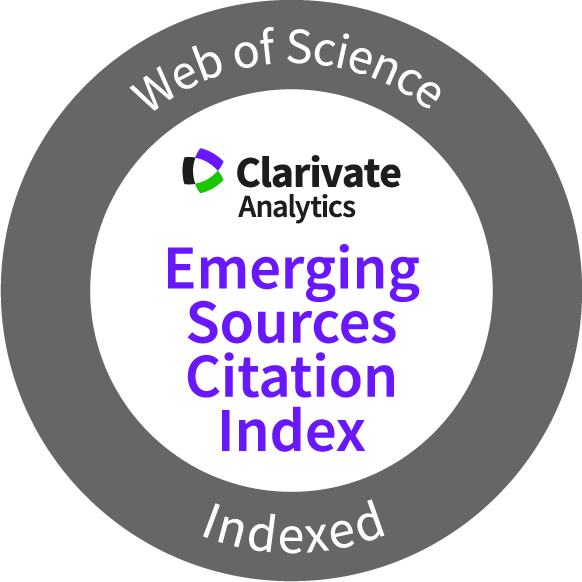From Zebrafish To Humans: In Silico Comparative Study of RAD50 Sequences
Keywords:
DNA repair, Danio rerio, Human, in-silico, RAD50Abstract
DNA damage, particularly the occurrence of DNA double-strand breaks (DSBs), presents a significant hazard to the integrity and viability of cells. Improper repair of DSBs can result in chromosomal alterations, oncogenic changes, or cell demise. The MRE11-RAD50-NBS1 (MRN) complex plays a crucial role in DNA repair and signaling under the Ataxia Telangiectasia Mutated (ATM) kinase regulation. In this study, we employed comprehensive computational techniques to analyze the structure of RAD50 in Danio rerio (Zebrafish), utilized as a model organism. Additionally, we conducted in silico assessments of RAD50 from both Zebrafish and humans, comparing their characteristics. The substantial sequence resemblance between DrRAD50 and HsRAD50 suggests that DrRAD50 could potentially serve as a valuable model for HsRAD50. However, it is important to acknowledge that sequence similarity alone does not necessarily imply functional equivalence. Further functional studies are needed to confirm the extent of their functional similarities. By examining the secondary and tertiary protein structures of RAD50, we observed a notable likeness between Zebrafish and Human RAD50 proteins. In silico analysis demonstrated that the sequence of RAD50 in zebrafish shares 70% similarity with the human RAD50 protein.
Downloads
Metrics
References
Abe, T., Ishiai, M., Hosono, Y., Yoshimura, A., Tada, S., Adachi, N., Koyama, H., Takata, M., Takeda, S., Enomoto, T. & Seki, M. 2008. KU70/80, DNA-PKcs, and Artemis are essential for the rapid induction of apoptosis after massive DSB formation. Cellular Signalling, 20(11): 1978-1985. DOI: https://doi.org/10.1016/j.cellsig.2008.07.006
Altschul, S.F., Gish, W., Miller, W., Myers, E.W. & Lipman, D.J. 1990. Basic local alignment search tool. Journal of Molecular Biology, 215(3): 403-410. DOI: https://doi.org/10.1016/S0022-2836(05)80360-2
Álvarez-Quilón, A., Serrano-Benítez, A., Lieberman, J.A., Quintero, C., Sánchez-Gutiérrez, D., Escudero, L.M. & Cortés-Ledesma, F. 2014. ATM specifically mediates the repair of double-strand breaks with blocked DNA ends. Nature Communications, 5: 3347. DOI: https://doi.org/10.1038/ncomms4347
Appel, B. & Chitnis, A. 2002. Neurogenesis and specification of neuronal identity. Results and Problems in Cell Differentiation, 40: 237-251. DOI: https://doi.org/10.1007/978-3-540-46041-1_12
Attwooll, C.L., Akpinar, M. & Petrini, J.H. 2009. The mre11 complex and the response to dysfunctional telomeres. Molecular Cell Biology, 20: 5540-51. DOI: https://doi.org/10.1128/MCB.00479-09
Azqueta, A., Slyskova, J., Langie, S.A.S., Neill Gaiv, I. & Collins, A. 2014. Comet assay to measure DNA repair: approach and applications. Frontiers in Genetics, 5: 288. DOI: https://doi.org/10.3389/fgene.2014.00288
Babb, S.G. & Marrs, J.A. 2004. E-cadherin regulates cell movements and tissue formation in early zebrafish embryos. Developmental Dynamics, 230(2): 263-277. DOI: https://doi.org/10.1002/dvdy.20057
Bally-Cuif, L. & Hammerschmidt, M. 2003, February 1. Induction and patterning of neuronal development, and its connection to cell cycle control. Current Opinion in Neurobiology, 13(1): 16-25. DOI: https://doi.org/10.1016/S0959-4388(03)00015-1
Barbelanne, M. & Tsang, W.Y. 2014. Molecular and Cellular Basis of Autosomal Recessive Primary Microcephaly. BioMed Research International, 2014: 547986. DOI: https://doi.org/10.1155/2014/547986
Barbi, G., Scheres, J.M.J. C., Schindler, D., Taalman, R.D.F. M., Rodens, K., Mehnert, K. & Muller, M. 1991. Chromosome instability and X-ray hypersensitivity in a microcephalic and growth-retarded child. American Journal of Medical Genetics, 40(1): 44-50. DOI: https://doi.org/10.1002/ajmg.1320400109
Bian, L., Meng, Y., Zhang, M. & Li, D. 2019. MRE11-RAD50-NBS1 complex alterations and DNA damage response: Implications for cancer treatment. Molecular Cancer, 18: 169. DOI: https://doi.org/10.1186/s12943-019-1100-5
Carnovali, M., Banfi, G. & Mariotti, M. 2019. Zebrafish models of human skeletal disorders: Embryo and adult swimming together. Biomed Research International, 2019: 1253710. DOI: https://doi.org/10.1155/2019/1253710
Ciapponi, L., Cenci, G., Ducau, J., Flores, C., Johnson-Schlitz, D., Gorski, M.M. & Gatti, M. 2004. The Drosophila Mre11/Rad50 complex is required to prevent both telomeric fusion and chromosome breakage. Current Biology, 14(15): 1360-1366. DOI: https://doi.org/10.1016/j.cub.2004.07.019
Eisen, J.S. & Smith, J.C. 2008. Controlling morpholino experiments: Don't stop making antisense. Development, 135(10): 1735-1743. DOI: https://doi.org/10.1242/dev.001115
Gao, G., Bi, X., Chen, J., Srikanta, D. & Rong, Y.S. 2009. Mre11-Rad50-Nbs complex is required to cap telomeres during Drosophila embryogenesis. Proceedings of the National Academy of Sciences of the United States of America, 106(26): 10728-10733. DOI: https://doi.org/10.1073/pnas.0902707106
Gatei, M., Jakob, B., Chen, P., Kijas, A.W., Becherel, O.J., Gueven, N., Birrell, G., Lee, J.H., Paull, T.T., Lerenthal, Y., Fazry, S., Taucher-Scholz, G., Kalb, R., Schindler, D., Waltes, R. & Dörk, T. 2011. ATM protein-dependent phosphorylation of Rad50 protein Regulates DNA repair and cell cycle control. Journal of Biological Chemistry, 286(36): 31542-31556.
Gatei, M., Jakob, B., Chen, P., Kijas, A.W., Becherel, O.J., Gueven, N., Birrell, G., Lee, J.H., Paull, T.T., Lerenthal, Y., Fazry, S., Taucher-Scholz, G., Kalb, R., Schindler, D., Waltes, R. & Dörk, T. 2011. ATM protein-dependent phosphorylation of Rad50 protein regulates DNA repair and cell cycle control. Journal of Biological Chemistry, 286(36): 31542-31556. DOI: https://doi.org/10.1074/jbc.M111.258152
Geourjon, C. & Deléage, G. 1995. SOPMA: significant improvements in protein secondary structure prediction by consensus prediction from multiple alignments. Bioinformatics, 11(6):681-684. DOI: https://doi.org/10.1093/bioinformatics/11.6.681
Gorski, J.C., Huang, S.M., Pinto, A., Hamman, M.A., Hilligoss, J.K., Zaheer, N.A., Desai, M., Miller, M. & Hall, S.D. 2004. The effect of echinacea (Echinacea purpurea root) on cytochrome P450 activity in vivo. Clinical Pharmacology & Therapies, 75(1): 89-100. DOI: https://doi.org/10.1016/j.clpt.2003.09.013
He, J., Shi, L.Z., Truong, L.N., Lu, C.S., Razavian, N., Li, Y. & Negrete, A. 2012. RAD50 zinc hook is important for the Mre11 complex to bind chromosomal DNA double-stranded breaks and initiate various DNA damage responses. Journal of Biological Chemistry, 287(38): 31747-31756. DOI: https://doi.org/10.1074/jbc.M112.384750
Heikkinen, K., Rapakko, K., Karppinen, S.M., Erkko, H., Knuutila, S., Lundán, T., Mannermaa, A., Børresen-Dale, A.L., Borg, Å, Barkardottir, R.B., Petrini, J. & Winqvist, R. 2006. RAD50 and NBS1 are breast cancer susceptibility genes associated with genomic instability. Carcinogenesis, 27(8): 1593-1599. DOI: https://doi.org/10.1093/carcin/bgi360
Hopfner, K.P., Karcher, A., Shin, D.S., Craig, L., Arthur, L.M., Carney, J.P. & Tainer, J.A. 2000. Structural biology of Rad50 ATPase: ATP-driven conformational control in DNA double-strand break repair and the ABC-ATPase superfamily. Cell, 101(7): 789-800. DOI: https://doi.org/10.1016/S0092-8674(00)80890-9
Howe, K., Clark, M.D. & Torroja, C.F. 2013. The zebrafish reference genome sequence and its relationship to the human genome. Nature, 496(7446): 498-503. DOI: https://doi.org/10.1038/nature12111
Kämäräinen, M., Heiskala, K., Knuutila, S., Heiskala, M., Winqvist, O. & Andersson, L.C. 2003. RELP is a novel human REG-like protein with up-regulated expression in inflammatory and metaplastic gastrointestinal mucosa. The American Journal of Pathology, 163(1): 11-20. DOI: https://doi.org/10.1016/S0002-9440(10)63625-5
Li, Y., Wang, J., Zhou, G., Lajeunesse, M., Le, N., Stawicki, B.N. & Lopez Corcino, Y. 2017. Nonhomologous end-joining with minimal sequence loss is promoted by the Mre11-Rad50-Nbs1-Ctp1 Complex in Schizosaccharomyces pombe. Genetics, 206: 481-496. DOI: https://doi.org/10.1534/genetics.117.200972
Lovell, S.C., Davis, I.W., Arendall, W.B., de Bakker, P.I.W., Word, J.M., Prisant, M.G. & Richardson, J. 2003. Structure validation by Cα geometry: ϕ,ψ and Cβ deviation. Proteins: Structure, Function, and Bioinformatics, 50(3): 437-450. DOI: https://doi.org/10.1002/prot.10286
Park, Y.B., Hohl, M., Padjasek, M., Jeong, E., Jin, K.S., Krężel, A., Petrini & J.H.J. 2017. Eukaryotic Rad50 functions as a rod-shaped dimer. Nature Structural & Molecular Biology, 24(3): 248-257. DOI: https://doi.org/10.1038/nsmb.3369
Paull, T.T. & Lee, J.-H. 2005. The Mre11/Rad50/Nbs1 complex and its role as a DNA double-strand break sensor for ATM. Cell Cycle, 4(6): 737-740. DOI: https://doi.org/10.4161/cc.4.6.1715
Petroni, M., La Monica, V., Fabretti, F., Augusto, M., Battaglini, D., Polonara, F., Di Giulio, S. & Giannini, G. 2023. The Multiple Faces of the MRN Complex: Roles in Medulloblastoma and Beyond. Cancers,15(14): 3599. DOI: https://doi.org/10.3390/cancers15143599
Petroni, M., Sardina, F., Infante, P., Bartolazzi, A., Locatelli, E., Fabretti, F. & Di Giulio, S. 2018. MRE11 inhibition highlights a replication stress-dependent vulnerability of MYCN-driven tumours. Cell Death & Disease, 9(9): 895. DOI: https://doi.org/10.1038/s41419-018-0924-z
Pražnikar, J., Tomić, M. & Turk, D. 2019. Validation and quality assessment of macromolecular structures using complex network analysis. Scientific Reports, 9: 1678. DOI: https://doi.org/10.1038/s41598-019-38658-9
Ramakrishnan, K., Sparks, R.A. & Berryhill, W.E. 2007. Diagnosis and treatment of otitis media. American Family Physician, 76(11): 1650-1658.
Rezaeejam, H., Shirazi, A., Izadi, P., Bazzaz, J.T., Ghazi-Khansari, M. & Valizadeh, M. 2018. Radioprotective effect of melatonin on expression of Cdkn1a and Rad50 genes in rat peripheral blood.
Rezaie, A., Parker, R.D. & Abdollahi, M. 2007. Oxidative stress and pathogenesis of inflammatory bowel disease: an epiphenomenon or the cause?. Digestive Diseases and Sciences, 52: 2015-2021. DOI: https://doi.org/10.1007/s10620-006-9622-2
Shibata, A., Moiani, D., Arvai, A.S., Perry, J., Harding, S.M., Genois, M.M. & Maity, R. 2014. DNA double-strand break repair pathway choice is directed by distinct MRE11 nuclease activities. Molecular Cell, 53(1): 7-18. DOI: https://doi.org/10.1016/j.molcel.2013.11.003
Singh, N., Basnet, H., Wiltshire, T.D., Mohammad, D.H., Thompson, J.R., Héroux, A. & Botuyan, M.V. 2012. Dual recognition of phosphoserine and phosphotyrosine in histone variant H2A.X by DNA damage response protein MCPH1. Proceedings of the National Academy of Sciences of the United States of America, 109(36): 14381-14386. DOI: https://doi.org/10.1073/pnas.1212366109
Syed, A. & Tainer, J.A. 2018. The MRE11-RAD50-NBS1 complex conducts the orchestration of damage signaling and outcomes to stress in DNA replication and repair. Annual Review of Biochemistry, 87: 263-294. DOI: https://doi.org/10.1146/annurev-biochem-062917-012415
Waltes, R., Kalb, R., Gatei, M., Kijas, A.W., Stumm, M., Sobeck, A. & Wieland, B. 2009. Human RAD50 deficiency in a nijmegen breakage syndrome-like disorder. The American Journal of Human Genetics, 84(5): 605-616. DOI: https://doi.org/10.1016/j.ajhg.2009.04.010
Wang, Y., Xu, Z., Bach, S.J. & McAllister, T.A. 2008. Effects of phlorotannins from Ascophyllum nodosum (brown seaweed) on in vitro ruminal digestion of mixed forage or barley grain. Animal Feed Science and Technology, 145 (1-4): 375-395. DOI: https://doi.org/10.1016/j.anifeedsci.2007.03.013
Wiltgen, M. 2018. Algorithms for structure comparison and analysis: Homology modelling of proteins. Encyclopedia of Bioinformatics and Computational Biology, 1: 38-61. DOI: https://doi.org/10.1016/B978-0-12-809633-8.20484-6
Yang, J. & Zhang, Y. 2015. I-TASSER server: New development for protein structure and function predictions. Nucleic Acids Research, 43(W1): W174-W181. DOI: https://doi.org/10.1093/nar/gkv342
Published
How to Cite
Issue
Section
Any reproduction of figures, tables and illustrations must obtain written permission from the Chief Editor (wicki@ukm.edu.my). No part of the journal may be reproduced without the editor’s permission




















